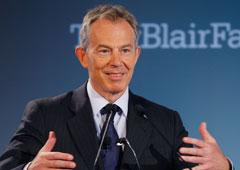

"At the start of a new decade, it is time to take religion seriously. ... There will be no peace in our world without an understanding of the place of religion within it." — Tony Blair
With his new Faith Foundation, former British Prime Minister Tony Blair follows other prominent political personalities who have used the platform that respect and renown have provided them to champion a worthy cause, in his case the causes of religious freedom and understanding. Like others who have been close to conflict and crisis, Mr Blair recognizes from his time in office the key role religion plays in working out solutions to some of the world’s most inextricable dilemmas. "Religion isn’t dying, nor should it," says Mr Blair. "The world needs faith" (New Europe Online).
As with Madeleine Albright, former US Secretary of State, who argued for religious understanding in international politics in her 2006 book, The Mighty and the Almighty, Mr Blair's call is clarion, lending his voice and influence to the need for governments to "take faith seriously" in crafting policies and creating international initiatives. "[R]eligion matters," says Mr Blair. "My experience as Prime Minister taught me that none of the problems of the Middle East and beyond – including Iran, Afghanistan, Pakistan, and Somalia – can be understood unless we comprehend the importance of religion. I don’t mean the politics of religion, but religion as religion. We cannot treat the influence of religious faith in purely secular terms. We must address it also as a genuine issue of faith."
To this end Mr Blair's Faith Foundation promises to be of interest to followers of the religion, conscience, and belief cases that come before the European Court of Human Rights. Mr Blair's Foundation takes a positive view of religion and belief which stresses understanding among peoples of different beliefs and characterizes religion as a potentially potent force for good in the international arena of politics, law and diplomacy.
"A] fundamental foreign-policy weakness, especially in the West," says Mr Blair, "is the assumption that political solutions alone provide a sensible path to the future. They don't. Those who feel that their faith compels them to act in a way destructive of mutual respect must be persuaded that this is a wrong reading of their faith; otherwise, such a faith-based compulsion will always trump secular political arguments." Through responsible decisions that affirm the rights of applicants to espouse and practice their faith and belief systems and, at the same time, place demands on all to use their beliefs to bless and benefit the lives of others, in and outside of their faith tradition, the European Court is a key agent in promoting peace on the level of individual, nation-state, and interstate relations.
Mr Blair states, "Democracy is not just about the free elections and the constitutional rule of the majority. It is about freedom of expression, freedom of religion, and markets that, albeit regulated, also are free and predictable. … What is needed are platforms of understanding, respect, and outreach in support of the open-minded view of faith."
In this spirit, the Strasbourg Consortium welcomes in the New Year in open-minded hopefulness that 2012 will prove to be a year in which religious freedom flourishes and the religions and beliefs so protected will make key contributions to international harmony and respect for human dignity.
